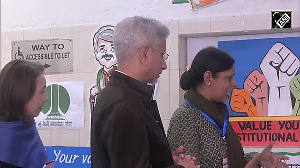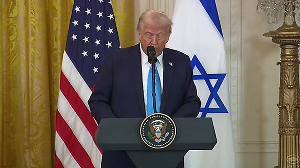Delhi's crime rate against women stood at 144.4 in 2022 -- the highest among all states and Union Territories.

In the run-up to Wednesday's Delhi ssembly elections, principal political parties in the fray -- the Aam Aadmi Party, Bharatiya Janata Party and Congress -- have laden their manifestos with multiple guarantees.
Dominating the agenda are direct cash transfers for women, expanded health care coverage, and subsidised education and electricity.
But long-existing issues -- deteriorating air quality, women's safety, and basic infrastructure challenges -- have been largely relegated to the sidelines, underscoring a shift in priorities of political parties.
"Over the years, discourse among political parties have shifted towards short-term goals, rather than long-term perspectives and achievements," says political campaign strategist Ankit Lal, who has previously worked with the AAP.
"Anything that can swiftly sway voters finds its way into manifestos."
The AAP's 2025 manifesto boasts 15 'Kejriwal ki guarantees', the BJP lists 16 sankalp (resolves) for a viksit (developed) Delhi, and the Congress presents five core promises.
Yet none directly address rising pollution, women's safety, or civic neglect -- issues that were central to the 2020 manifestos.
That year, the AAP's 10 guarantees included a pollution-free Delhi plan, a commitment to plant 20 million trees, and measures to slash pollution by a third.
Women's safety initiatives then included Mohalla Marshals, CCTV installations, streetlights, and bus marshals.

For the Congress and the BJP, once-detailed commitments have noticeably shrunk.
The BJP's latest Sankalp document omits any direct mention of women's security, replacing it with a broader 'Women Empowerment' section, which proposes anti-Romeo squads, more CCTV cameras, and a new Jhalkari Bai Battalion -- the city's first all-women Provincial Armed Constabulary battalion.
In 2020, the BJP had put forth nine detailed proposals, including a dedicated security cell, a Rani Laxmibai Mahila Suraksha Yojana, 24-hour call centre, the elimination of all dark spots in the city, and fast track courts dedicated to handling cases involving women.
"New issues emerge over time and are reflected in manifestos," says Delhi BJP spokesperson Praveen Shankar Kapoor, citing provisions for gig workers, domestic helpers, and students preparing for government exams.
On women's security, Kapoor contends that the matter is "more social than political."
"We can empower women through schemes like Mahila Samriddhi Yojana," he adds.
The Congress, which has pledged a monthly Rs 2,500 direct cash transfer to one woman in every poor household, has similarly steered clear of detailing plans for women's security.
"Direct cash transfers have gained traction over the years, but the legality of such promises before elections needs debate," says Lal.

Aasha Kapur Mehta, chairperson of the Centre for Gender Studies at the Institute for Human Development, argues that while government aid is essential for women unable to work, job creation should remain a core policy goal.
"Since growth does not automatically enable access to decent work for a large proportion of the working population, policies must be such that they generate jobs, enabling them to earn a living wage," says Mehta.
The Congress manifesto outlines 14 guarantees for women, children, the elderly, and people with disabilities, including an essential helpline, self-defence classes, and enforcement of Vishakha guidelines.
"For women security, we are working on a policy to reduce the rate of IPC crimes in Delhi," says Abhay Dubey, party's national media coordinator.

According to the National Crime Record Bureau's Crime in India report 2022 (the latest), Delhi's crime rate against women stood at 144.4 in 2022 -- the highest among all states and Union Territories -- with reported cases rising from 10,093 in 2020 to 14,247 in 2022.
"Basic measures like ensuring well-lit streets are still overlooked," adds Mehta, herself a resident of Delhi.
Meanwhile, the pollution debate has been largely reduced to a blame game, focused primarily on the Yamuna river.
Data from the ministry of environment, forest and climate change shows that Delhi's average AQI in 2024 was 209, worse than 204 in 2023 and 185 in 2020.
The number of 'poor to severe' AQI days (201-400+) has remained virtually unchanged, dipping slightly to 157 from 159 in 2023.
In 2020, the BJP came out with separate plans for clean energy infrastructure, systems for tracking air pollution, comprehensive afforestation campaigns, and incentives for collecting plastic waste.
While the party continues to highlight pollution in its latest manifesto, references to solar energy infrastructure, plastic reduction, green cess, and 'pari yantra' air pollution trackers have declined.
Many of BJP's schemes are designed in partnership with the central government.
"For a city like Delhi, sometimes, the manifestos are designed keeping the role of the central government in mind," says political analyst Robbin Sharma.
The Congress, which in 2020 promised to allocate 25 per cent of the Budget to combat pollution, has dropped this commitment in 2025.
The party had then proposed environmental ambassadors, rice stubble management, and a fund to increase green cover and push electric mobility, all of which are now absent.
This year's manifesto focuses on Yamuna clean-up efforts, sewage systems, and garbage disposal but lacks a concrete plan for tackling high AQI levels.
"The topic is very much present in campaigning. PowerPoint presentations on managing pollution are being shown in rallies," says Dubey, adding that a detailed plan is ready with the party.
As Delhi's electorate prepares to cast its vote, whether the aforementioned broader shift in manifestoes resonates with voters remains to be seen.
Photographs curated by Anant Salvi/Rediff.com
Feature Presentation: Aslam Hunani/Rediff.com












 © 2025
© 2025